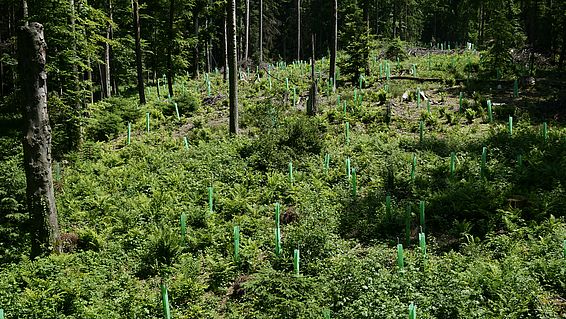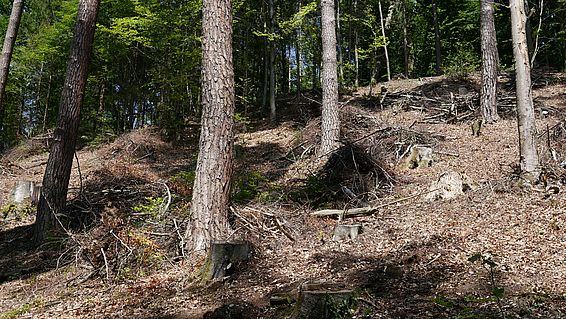14.08.2019 | Reinhard Lässig/Kanton Luzern | News WSL
Forests are already feeling the effects of climate change. Targeted measures can help forests adapt to the changing climatic conditions and ensure that they fulfil their functions in future. At the Forest Fair in Lucerne on 15-18 August 2019, the federal government and the cantons will present a new app for forest experts and anyone else interested in forestry. The app shows tree species suited to specific locations that can adapt to and thrive in a changed climate.
The 2018 summer drought was the longest period without precipitation since systematic weather records began in 1864. This phenomenon, combined with very high temperatures, caused forest soils to dry out considerably. The damage can clearly be seen in the canton of Lucerne. At lower elevations, many weakened Norway spruces fell victim to bark beetles in 2018. The drought has further encouraged the rapid reproduction of these insects. Even some deep-rooted silver firs died. Forests in other cantons were also severely affected. In the cantons of Aargau, Jura, Schaffhausen, Zurich and in both Basels, beeches also suffered from a lack of water. Targeted measures can be taken to help forests adapt to the changing climatic conditions and ensure that they will still be able to fulfil their functions in future.
A new app helps to promote future-proof tree species
In view of the effects and extent of climate change in forests, the Federal Office for the Environment (FOEN) and the Swiss Federal Institute for Forest, Snow and Landscape Research (WSL) developed a set of basic forest management principles as part of the Forests and Climate Change research programme. The programme, which ran from 2009 to 2018, developed strategies for managing the changes as well as practical instruments for the cantons' forest specialists.
Trees germinating today will likely be growing up in a much-altered climate by the time they reach middle age. It is therefore essential that forest specialists and owners know which tree species will be able to survive in the future. A new prototype app being unveiled at the Forest Fair will help them do just that. The app uses data based on the site-ecological principles for forest management in the face of climate change developed during the research programme Forests and Climate Change. It can be used in every part of Switzerland to get an idea of which tree species should be favoured now when tending young forests. Forest specialists will be given tips on which tree species should be promoted or planted in young forests.
Preserving forest functions and services for the future
The climate is changing so quickly that important medium to long-term forest functions are under threat. Silvicultural measures that help forests adapt to warmer temperatures can contribute to the long-term preservation of these functions. This should enable forests to continue protecting against natural hazards, supplying timber for construction and heating, and providing recreational spaces for people as well as important habitats for numerous plants and animals.
Another finding from the research programme is that altitudinal vegetation zones will shift upwards by 500-700 metres in altitude by the end of the 21st century, depending on how the climate develops. In practical terms, this mean that large areas of natural coniferous or mixed forests will become purely deciduous forests in future. The tree species app now makes these findings available to forest specialists.
Stand at the Forest Fair in Lucerne (hall 2, stand B10)
The 'Designing forests of the future – tree species for the changing climate' stand at the Lucerne Forest Fair taking place from 15 to 18 August 2019 is the result of a collaboration between the Federal Office for the Environment (FOEN), the Swiss Federal Institute for Forest, Snow and Landscape Research (WSL) and the Conference of Cantonal Foresters (KOK/CIC).
The prototype tree species app (www.tree-app.ch) can be tested at the stand. The web-based app will be particularly helpful for forest experts and owners. A full version is due to be released by the end of 2019.
Contact
Bruno Röösli
Dienststelle Landwirtschaft und Wald (lawa), Kanton Luzern
bruno.roeoesli(at)lu.ch
+41 79 758 40 34
Links and documents
- Frehner, M.; Brang, P.; Kaufmann, G.; Küchli, C., 2018: Standortkundliche Grundlagen für die Waldbewirtschaftung im Klimawandel. WSL Berichte, 66. 49 p. (German only)
- Research programme Forests and Climate Change (WSL webseite)
- Fact sheet 'Designing forests of the future – tree species for a changing climate' (pdf)
- tree species app: tree-app.ch
- Frehner, M.; Huber, B.; Gubelmann, P.; Zürcher-Gasser, N.; Zimmermann, N.E.; Braun, S.; Scherler, M.; Zischg, A.; Burnand, J.; Carraro, G.; Bugmann, H.; Psomas, A. (2019): Schlussbericht des Projektes «Adaptierte Ökogramme» im Forschungsprogramm «Wald und Klimawandel». Übersicht über die Teilberichte.
- Frehner, M.& Zürcher-Gasser, N. 2019. Schlussbericht des Projektes «Adaptierte Ökogramme» im Forschungsprogramm «Wald und Klimawandel», Teil 5: Herleitung von regional optimierten Baumartenempfehlungen.Sargans, Forstingenieurbüro Frehner und Rabius, Gadola AG. 24 Seiten.
Copyright
WSL and SLF provide image and sound material free of charge for use in the context of press contributions in connection with this media release. The transfer of this material to image, sound and/or video databases and the sale of the material by third parties are not permitted.


